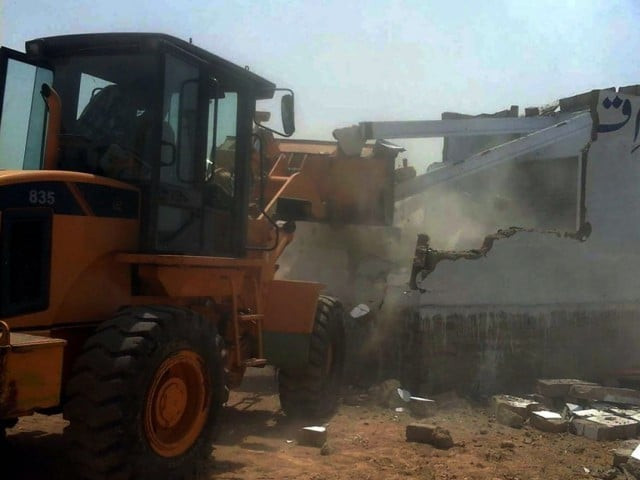Over 1,200 residential and commercial units demolished in Afghanistan’s Khema Basti during operation
A major anti-encroachment campaign entered its fifth day in Karachi, as authorities continued a large-scale demolition in the Gulshan-e-Maymar Afghan refugee camp, razing hundreds of illegal structures built on government land.
According to authorities, more than 1,200 residential and commercial units have been demolished so far in the locality known as Afghan Khema Basti, which was established in 1984 and spreads over around 215 acres. The area, valued in billions of rupees, falls under the jurisdiction of the Malir Development Authority (MDA).
Anti-encroachment director Amir Fazal Owaisi and SHO Zone 1 Shayan Anjum said the operation was part of the government’s broader policy to repatriate Afghan nationals and reclaim encroached public lands. The camp previously housed more than 3,200 structures and housed thousands of Afghan refugees.
Learn more: Demolitions of Afghan houses begin in Karachi’s Sohrab Gothic Quarter
Sunday’s phase of the operation involved coordinated teams from Anti-Encroachment Force Zone 1, MDA and district police. Heavy machinery was deployed to flatten the structures, while a heavy police presence was ensured to prevent any disorder.
DSP Manghopir Masroor Ahmed Jatoi said the camp once housed around 15,000 Afghan refugees, of whom more than 90 per cent, or around 14,000 people, have already returned to Afghanistan. “The remaining 800 to 1,000 residents are expected to leave in the coming days,” he added.
He confirmed that similar anti-encroachment actions were being carried out in other parts of Karachi against Afghan nationals residing illegally, in line with official policy.
Officials said the ongoing operations in Gulshan-e-Maymar would continue until all encroachments are cleared and the land is completely reclaimed.
Meanwhile, several Afghan families remain in the settlement, packing their belongings before preparing to leave. Many were seen selling scrap materials such as iron bars, doors and window frames from their homes to local dealers, in addition to taking household items with them for their journey back to Afghanistan.




